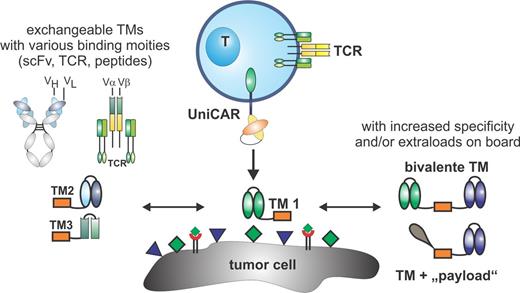Abstract
The adoptive transfer of T cells engineered with chimeric antigen receptors (CARs) is currently considered as a highly promising therapeutic option for treatment of otherwise incurable malignant diseases. CARs combine the cellular and humoral arm of the immune response by assembling a single-chain fragment variable (scFv) as binding moiety which provides the antigen-specificity and an activating immune receptor. It has been demonstrated both in vitro and in vivo, that CAR engrafted effector T cells mediate long-lasting anti-tumor responses. Despite encouraging clinical efficacy targeting CD19 in recent clinical trials, the appearance of potentially life-threatening adverse reactions and the lack of control mechanisms once initiated, prevent more widespread application of the CAR technology.
To overcome limitations of conventional CAR T cells, a unique chimeric antigen receptor (UniCAR) technology was developed (Fig. 1) which allows precise control of CAR T cell reactivity, thus lowering the risk of side effects while preserving efficacy. Moreover, the UniCAR technology enables the retargeting of engrafted T cells against more than one antigen simultaneously or subsequently, thus reducing the risk for development of antigen-loss tumor variants under treatment. The UniCAR technology splits the signaling and antigen-binding aspects of conventional CAR into two individual components. T cells are engineered to express a universal CAR (UniCAR), which has specificity for a short peptide motif of 10 amino acids derived from a human nuclear protein. Thus, T cells engineered to express UniCAR remain inactivated after re-infusion, since the UniCAR target is not available for binding under physiological conditions. The ultimate antigen-specificity of the system is provided separately by targeting modules (TMs) comprising a binding domain e.g., a tumor-antigen specific scFv, fused to the nuclear antigen motif recognized by the UniCAR binding domain. Here we provide first in vitro and in vivo prove of concept for this new approach. Antigen-specific redirection of T cells armed with the universal CAR in the presence of different targeting modules against various antigens (CD33, CD123, CD19, CD20, PSCA, PSMA,) was effective at femtomolar concentrations of the targeting module both. Taken together, the modular nature of UniCAR technology will allow retargeting of autologous, patient-derived T cells to several antigens under controlled pharmacological conditions and has the potential to become a highly effective treatment option for late stage cancer patients with reduced risks for side effects.
Schematic representation of T cell recruitment with the modular UniCAR system.
The UniCAR T cell recruitment system consists of two separated units. The first unit is the UniCAR expressed on T cells with a single-chain fragment variable (scFv) specific for a short 10 aa long peptide motif. The intracellular signalling domain of the UniCAR contains a costimulatory domain derived from CD28 and the T cell receptor z chain. The second unit is a targeting molecule (TM) which consists of a scFv fused to the peptide epitope. The cross-linkage of T cell and target cell is mediated by interaction between the UniCAR binding domain on T cells and target cell binding TM.
Schematic representation of T cell recruitment with the modular UniCAR system.
The UniCAR T cell recruitment system consists of two separated units. The first unit is the UniCAR expressed on T cells with a single-chain fragment variable (scFv) specific for a short 10 aa long peptide motif. The intracellular signalling domain of the UniCAR contains a costimulatory domain derived from CD28 and the T cell receptor z chain. The second unit is a targeting molecule (TM) which consists of a scFv fused to the peptide epitope. The cross-linkage of T cell and target cell is mediated by interaction between the UniCAR binding domain on T cells and target cell binding TM.
Cartellieri:Cellex Patient Treatment GmbH: Employment. Loff:GEMoaB Monoclonals GmbH: Employment. Ehninger:GEMoaB Monoclonals GmbH: Employment, Patents & Royalties: related to the UniTARG system. Ehninger:GEMoaB Monoclonals GmbH: Equity Ownership; Cellex Patient Treatment GmbH: Equity Ownership. Bachmann:GEMoaB Monoclonals GmbH: Equity Ownership, Patents & Royalties: related to the UniTARG system.
Author notes
Asterisk with author names denotes non-ASH members.


This feature is available to Subscribers Only
Sign In or Create an Account Close Modal